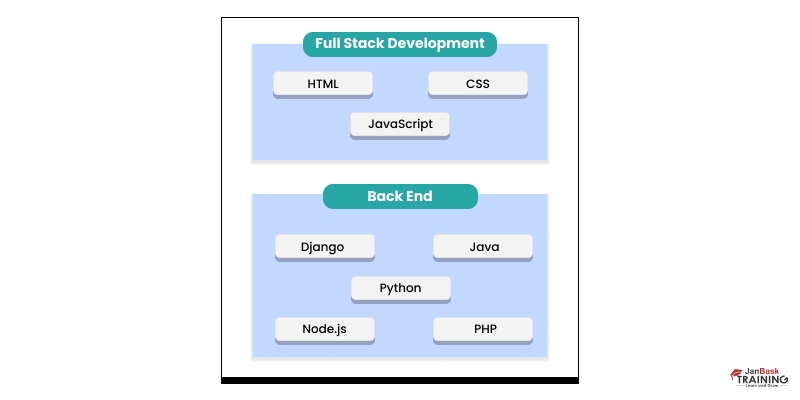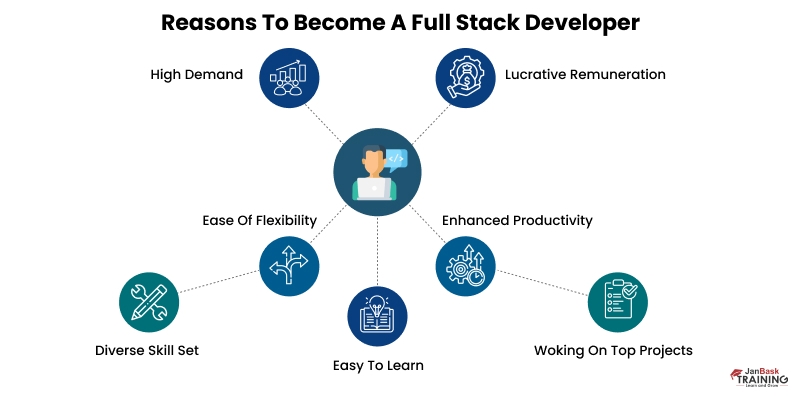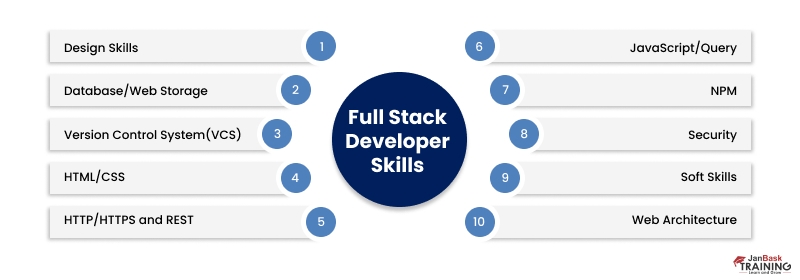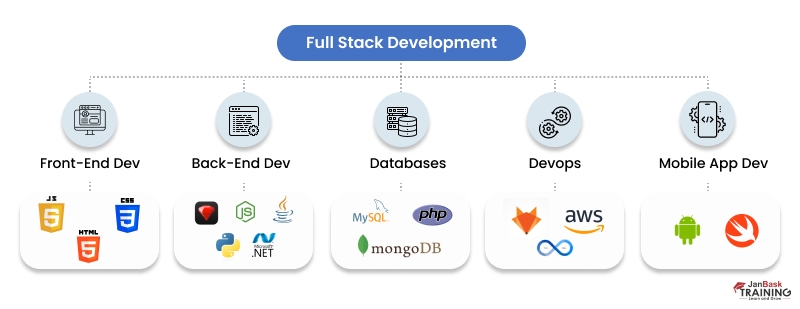Introduction
Full stack developers play a crucial role in the creation and maintenance of websites and applications that're essential to our daily lives. A full stack developer handle all aspects of software development. The growing demand for applications has led to an increasing need for full stack developers.
If you're looking for guidance on making or advancing in your career as a full stack developer you've come to the right place. Keep reading to discover the steps involved in achieving the role of a full stack developer.
What is Full Stack Development?
Full stack development refers to the process of creating user application software that includes both the front-end and back-end components.
The front end of an application focuses on the user interface and user experience while the back end handles the logic and operations to make the software responsive and easy to use.
Let's consider an example of a store. Users can. Access products, add or remove items from their cart, update their profile and perform various other activities. By using a front end user interface (UI) in tandem, with business logic these activities can be implemented effectively enhancing the shopping experience.

To build a user end various technologies like HTML, CSS and Javascript are employed to create the website's UI.
When it comes to building a backend programming languages such as Java or Python are commonly used. Additionally, for applications that require scalability, event handling capabilities and routing functionalities, libraries and frameworks like SpringBoot or Django are often leveraged.
The back end part also includes a range of functions that help connect the application, with external services and databases. An example of this idea is when user and transaction data are stored in a database using drivers managed on the backend.
A full stack developer has the skill to handle both end and back end tasks independently like placing an order or updating a user's profile.
What are the Roles & Responsibilities of a Full Stack Developer?
Full-stack developers are professionals with the skills and knowledge to handle both the front-end and back-end development of web applications. They are proficient in multiple layers of software development and are capable of working on various aspects of application development.
Roles and Responsibilities of a Full Stack Developers Include:
- Web Development; Full stack developers have the responsibility of creating web applications from start to finish. They take care of both the client side (end) and server side (end) components to ensure seamless integration and functionality.
- Front end Development; Full stack developers are in charge of tasks related to front end development, which includes designing the user interface and user experience (UI/UX) elements of an application. They employ HTML, CSS and JavaScript along with frameworks like React, Angular or Vue.js to construct the features and interactive aspects of the application.
- Back end Development; Full stack developers handle back end development tasks such as building server side logic managing databases and handling server operations. They utilize programming languages like Python, Java, PHP or Node.js as frameworks like Django, Spring, Laravel or Express.js for data storage management, processing tasks and server side functionalities.
- Database Management; Full stack developers are proficient in working with databases for storing data while ensuring retrieval. They have expertise in working with databases like MySQL or PostgreSQL well as NoSQL databases such as MongoDB or Redis. Their responsibilities include data modeling and query optimization to maintain data integrity.
- API Development and Integration; Full stack developers are responsible for designing and creating APIs (Application Programming Interfaces) that enable communication between systems and services. They utilize APIs, GraphQL or other protocols to facilitate the exchange of data and ensure compatibility across components of an application.
- Troubleshooting and Bug Fixing; Full stack developers excel in problem solving. Have the ability to identify and resolve issues that may arise in both the end and back end aspects of a project. They possess the skills to debug and fix problems related to functionality, performance or compatibility.
- Collaboration and Communication; Full stack developers work closely with team members such as designers, product managers and other developers. They effectively communicate project requirements, provide guidance when needed and ensure coordination throughout the development process.
- Continuous Learning; Full stack developers prioritize staying up to date with the technologies, frameworks and best practices within their field. They constantly strive to enhance their skills by adapting to industry trends and advancements.
- Project Management and Ownership; Full stack developers are capable of taking charge of projects from start to finish. This includes making decisions, planning projects and ensuring, on time delivery of high quality applications.
Full stack developers possess a skill set that allows them to handle responsibilities throughout all stages of application development.
They possess adaptability, versatility and the capability to work both autonomously and collaboratively. Their aptitude for connecting end and back end development renders them invaluable assets, in the software development sector.
Is Full-stack development a rewarding career option?

-
In-Demand Jobs: The occupation of a full stack web developer has become sought after, in years due to the rapid advancements and ever changing nature of technology. Many organizations aim to provide an experience, which can be achieved by having one individual responsible for both client side and server side coding.
Having a single person handle these responsibilities offers benefits such as pay, access to resources and a wider range of ideas. Based on employment market trends the demand for full stack web developers is expected to remain strong in the future. Employers recognize the value of individuals who possess a range of expertise.
-
High Salary: Like any demanding job being a full stack developer comes with substantial compensation. On average these professionals earn around 6 lakh rupees which exceeds the income of web developers.
By acquiring the skills and targeting organizations strategically individuals have the potential to secure salaries that are above the national average. The actual remuneration may depend on factors such, as education level, professional background and geographical location.
-
Career Prospects: Nowadays full stack developers are in demand worldwide. Labor market predictions indicate that there will be job positions created or specifically allocated for those with full stack development skills. These work opportunities can pave the way for a career trajectory. Improving your skills can also give you an edge when searching for jobs.
In this context individuals have the chance to utilize their abilities and showcase their problem solving expertise. As the point of contact, for your team you'll play a role that significantly contributes to your professional growth. It also allows you to stay updated with trends and advancements.
-
A Valuable Skill: The ease of understanding makes knowledge acquisition easier. The employability of a full stack web developer depends on both the quantity and quality of their skill set. Thankfully there are study resources and self paced group options that you can readily access. You can even participate in training courses specifically focused on full stack web development.
There are a variety of online classes available that offer a comprehensive understanding of foundational concepts and specialized knowledge. It's important to choose a course that lays a foundation, in the basics as this will enable you to excel in technologies built upon those fundamental principles.
Our Full Stack offline Course provides training in mastering the MEAN stack, which is highly regarded and favored within the development community. Beginning with this stack is a strategy for aspiring web developers who aim to become proficient in full stack development. You can gain expertise in the MEAN stack through our program located here.
When selecting a course it's advisable to opt for one that offers opportunities for engaging in mini projects and a comprehensive course project. This approach allows you to build a portfolio, which significantly increases your chances of securing employment when combined with the certification you'll receive.
-
Flexible: Flexibility is a characteristic that includes adaptability and the ability to adjust or change as needed. Performing tasks independently provides freedom while also enabling efficient completion, within shorter timeframes.
To be highly effective it is crucial to have the skills to proficiently develop, manage and troubleshoot technologies, including both end and back end frameworks.
Having knowledge in full stack web development technologies will make you more desirable, as a team member. You don't need to wait for others to finish their tasks before proceeding with your responsibilities. This reduces reliance on a group of individuals. This can be seen in the organization's performance, which in turn affects your compensation.
-
Future Potential: There are possibilities for utilizing full stack web development. These technologies can be used to build AI powered chatbots, progressive web applications and other similar projects. The unique characteristic of this skill set is its versatility.
The demand for full stack web developers is widespread across all industries. In todays business landscape the internet has become a tool making it nearly impossible for any significant event or occurrence to happen without its involvement. Companies prefer focusing their investments on a resource than spreading them across multiple resources, for similar tasks.
Given your combination of skills you will likely have the chance to carefully evaluate and choose job opportunities. Expanding your skillset is important as individuals possess their set of talents and may encounter requirements when interacting with diverse clients. Full stack web development involves a stack and various other tools.
In order to secure a client it might be necessary to acquire skills. However continuously learning and acquiring abilities not only adds value to your resume but also strengthens your professional reputation.
Skills Required to be a Full Stack Developer

1. Understanding HTML and CSS
In order to discuss the building blocks of a website's appearance and structure it's important to familiarize ourselves with HTML and CSS. HTML, also known as Hypertext Markup Language can be compared to an architect's blueprint. It is used by developers to shape the layout and visual elements of text and images on a website. From headings and paragraphs, to pop ups HTML arranges everything to create the structure of a webpage.
On the hand we have CSS or Cascading Style Sheets. Think of it as an artist's palette that allows you to paint the HTML elements with colors, fonts and styles. If you want your headings and paragraphs to have their hues, CSS is the tool that helps achieve that personalized touch.
For those who aspire to become proficient in full stack development mastering these front end tools is crucial. These languages play a role in enhancing user experience and the visual appeal of web applications.
2. The Significance of JavaScript
When it comes to delving into full stack development JavaScript takes stage. This dynamic language empowers developers to bring interactivity and finesse to the end of websites or applications. What makes JavaScript more fascinating is its versatility – it isn't limited to client side work but also plays a role, on the server side.
JavaScript seamlessly integrates with HTML and CSS making the lives of developers easier, by giving them the power to create web pages that're dynamic and responsive. Moreover, there are frameworks like Angular, React React Native and Vue that provide capabilities for front end development.
For a full stack developer JavaScript is more than a basic acquaintance. It requires mastery of its functionalities and a deep understanding of the evolving libraries and frameworks that drive progress.
3. Git and GitHub
In web development, Git and GitHub play roles in keeping things organized. They are well known among both aspiring coders and experienced professionals.
Git is a distributed version control system that allows developers to meticulously manage every step of their development journey. Its standout feature lies in its ability to solve errors effectively while providing tracking. With Git you can document your progress, make edits capture snapshots of your work backtrack when necessary and much more.
On the other hand GitHub is a platform where developers collaborate on multiple projects simultaneously while managing them effectively. As the name suggests it serves as a hub for networking and interaction among developers. Leveraging all the features offered by Git GitHub enables teamwork, among developers.
As a full stack developer exploring these platforms goes beyond writing code. It's an opportunity to learn about team management, leadership and collaboration. Moreover it empowers developers to efficiently work with code by utilizing the environments offered by these platforms.
4. Languages, for Backend Development
Being a full stack developer involves handling both end and backend responsibilities. This requires an understanding of programming languages.
Here are some important players in the world of development;
- Python; Python stands out in development with frameworks like Django and Flask. Its syntax and versatile features make it suitable for high level programming approaches.
- Java; This class-based programming language isn't limited to web applications; it also serves as the foundation for desktop apps. Java's versatility sets it apart.
- PHP; Known for its speed and compatibility across operating systems PHP excels at server-side scripting. Its resilience makes it a popular choice for work.
- Ruby; Operating in both the web app domains Ruby boasts simplicity, dynamic typing and object-oriented principles. The Rails framework that comes with Ruby further enhances efficiency. Is favored by developers.
These languages comprise the toolkit of a full-stack developer to enhance proficiency and achieve excellence.
5. Understanding Web Architecture
To excel as a full stack developer it is crucial to embrace learning. This journey begins by grasping the fundamentals of web architecture.
As an expert a full stack developer must be familiar with the user interface elements of web applications. This includes having knowledge about DNS (Domain Name System) Database Servers and Cloud Storage.
6. Managing Database Systems
A skilled full stack developer goes beyond programming languages and excels in handling databases.
Being part of a development team involves managing databases. This requires being well versed in systems such as Oracle, MySQL, SQLite and Microsoft Access – the engines that keep data functioning
7. Grasping Design Fundamentals
While there are distinctions between development and design these boundaries don't restrict a full stack developer. Having an understanding of design principles is advantageous for creating user centric front end experiences.
This skill helps developers tap into user psychology to enhance the appeal of client side applications.
8. Understanding REST and SOAP
The role of a full stack developer is akin to being a bridge, between two aspects of web app development; communication.
That's where the real skill lies in working with web services or APIs (Application Programming Interfaces) like REST and SOAP.
These services make it easier to exchange data between systems, which ultimately improves efficiency and productivity.
9. Technology Stacks
A full stack developer is someone who can work with technologies adapting and upgrading as needed to handle changing roles and responsibilities. Different companies have their technology preferences so it's important to stay updated on stacks for effective web app development.
Each preferred stack, such as LAMP and Django has its characteristics and features. Understanding these nuances and the different layers involved is crucial for application development.
Future Scope of Full Stack Developer
According to research published by LinkedIn the demand for full stack engineers has consistently grown at a rate of 35% per year since 2015. A recent analysis by the US Bureau of Labor Statistics predicts growth in employment opportunities for professionals in this field. It is projected that the number of positions will increase from 135,000 to over 853,000 by 2024.
In addition many companies now offer payment after job placement in Web Development programs. This creates opportunities for MERN stack engineers to start their careers while reducing financial uncertainties. Moreover this vocational path is known to be highly lucrative. Offers a range of employment options. Therefore the job prospects for MERN stack engineers look very promising.
How to Become a Full-Stack Developer
Becoming a full-stack developer is like embarking on a quest to acquire a treasure trove of skills and certifications that will catapult you into the tech realm's stratosphere. Buckle up as we unveil your express guide to joining the coveted ranks of Full Stack developers.

Becoming a full stack developer is an exciting journey that requires dedication, continuous learning, and a well-structured approach. Here's a step-by-step guide on how to become a full stack developer:
Start with the Basics: Begin by mastering the fundamental technologies that full stack developers use. This typically includes:
Front-End Development: HTML/CSS: Learn to create web pages and style them.
JavaScript: Understand the core language, including ES6+ features.
Front-end Frameworks: Familiarize yourself with popular frameworks like React, Angular, or Vue.js.
Back-End Development: A server-side language: Choose one, such as JavaScript (Node.js), Python, Ruby, Java, or PHP.
Databases: Learn how to work with databases like MySQL, PostgreSQL, MongoDB, or Firebase.
Server Frameworks: Explore frameworks like Express (Node.js), Django (Python), Ruby on Rails, or Spring (Java).
Gain Proficiency in Web Development: Understand how web servers and HTTP requests work.
Learn about RESTful API design and implementation.
Explore version control systems like Git for code management.
Database Management: Master database design and normalization techniques.
Learn how to write SQL queries to retrieve and manipulate data.
Server-Side Development: Create server applications to handle requests and responses.
Implement user authentication and authorization mechanisms.
Front-End Development: Develop responsive and user-friendly interfaces.
Utilize CSS preprocessors like SASS or LESS for efficient styling.
Practice building interactive web applications with JavaScript frameworks.
Version Control: Learn Git and use platforms like GitHub or GitLab for collaboration and code versioning.
Build Full Stack Projects: Apply your knowledge by working on full stack projects. Start with smaller projects and gradually move to more complex ones. This will help you solidify your skills.
Learn about DevOps: Understand the basics of DevOps practices, including continuous integration (CI) and continuous deployment (CD).
Testing and Quality Assurance: Explore testing frameworks and methodologies to ensure your applications are bug-free.
Stay Current: Technology evolves rapidly, so stay updated with the latest trends and tools in the web development industry.
Seek Guidance and Resources: Join online communities, forums, and attend meetups to learn from experienced developers.
Consider enrolling in online courses or bootcamps that offer full stack development curriculum.
Get Practical Experience: Internships or freelance work can provide valuable real-world experience.
Certifications: Consider pursuing certifications in relevant technologies, such as AWS, Docker, or specific programming languages.
Build a Portfolio: Create a portfolio showcasing your projects and skills. It's a powerful tool for demonstrating your abilities to potential employers.
Apply for Jobs: Start applying for full stack developer positions, emphasizing your skills and portfolio during interviews.
Continuously Learn and Grow: The tech industry is dynamic; keep learning and adapting to new technologies and methodologies.
Full Stack Developers vs. Front-End or Back-End Developers
|
Aspect
|
Full Stack Developers
|
Front-End Developers
|
Back-End Developers
|
|
Definition
|
Expertise in both end front and back end development, where developers are expected to handle the process of building applications.
|
The main focus lies in creating user interfaces that enhance the user experience. This involves designing website layouts and ensuring their responsiveness, on devices.
|
Specializes in developing application logic on server side, managing databases and ensuring data processing.
|
|
Skills Required
|
Proficient in programming languages such as JavaScript, Python and Ruby. Additionally, have experience working with databases and frameworks for both end and back end development.
|
When it comes to front end development, developers have a command over HTML, CSS and JavaScript. They are also familiar with front end frameworks like React and Angular which enable me to create engaging user interfaces.
|
In-depth knowledge of languages like Java, PHP and Ruby on the server side. Furthermore, well acquainted with databases and APIs. My expertise lies in handling data processing while optimizing server performance.
|
|
Responsibilities
|
Specializes in creating web applications. This involves managing server side logic as databases while ensuring smooth functionality across all aspects of the application.
|
Designs interfaces that prioritize user interaction and responsiveness.
|
Excel at managing server side scripting alongside databases and APIs to ensure data processing while maintaining server performance.
|
|
Scope
|
Generally, versatile and are suitable for projects or startups where resource efficiency's crucial.
|
Focusing on enhancing the user experience and interface it becomes crucial for the aspects of applications that directly interact with users.
|
Manages back end operations, data processing and server side functionalities.
|
|
Collaboration
|
In order to effectively collaborate with both end and back end teams they must possess an understanding of the entire application architecture.
|
Their close collaboration with designers and user experience experts is essential to bring their designs to life ensuring seamless user interaction.
|
Working hand in hand with front end developers and system administrators they play a role in ensuring server side operations and effective data management.
|
|
Career Opportunities
|
The opportunities available for them are wide ranging as they possess the ability to handle end to end development. This makes them highly sought after by startups and companies aiming to optimize their resources.
|
There are also opportunities specifically focused on user interface and user experience design. These roles are often required by companies that prioritize appeal and aim for user engagement.
|
Opportunities centered around server side development and meticulous data management. These roles play a part in applications that require data processing capabilities along with efficient server operations.
|
Certification Courses and Training for Full Stack Developers
There are several certification courses and training options available for aspiring Full Stack Developers. These programs aim to equip you with the necessary skills to handle both front-end and back-end development. Here are a few popular ones:
1. Janbask Training: Our program provides training for Full Stack certification, which helps individuals create a roadmap to become skilled web developers. As a result they can position themselves as IT professionals in the job market. In the discussion we will briefly explore the reasons behind the appeal of our Full Stack web developer certification, among learners.
2. FreeCodeCamp - Full Stack Developer Certification: FreeCodeCamp offers a self-paced, free curriculum covering HTML, CSS, JavaScript, databases, Git, Node.js, and more. Completing projects will help you build a strong portfolio.
3. Codecademy - Full Stack Engineer: Codecademy's course covers front-end and back-end technologies like HTML, CSS, JavaScript, React, Node.js, and Express.js, enabling you to build full stack applications.
4. The Odin Project - Full Stack Curriculum: This is a free, open-source curriculum that guides you through learning HTML, CSS, JavaScript, Ruby, Rails, and more. It emphasizes hands-on projects.
5. LinkedIn Learning: There are various courses on LinkedIn Learning covering full stack development using different technologies. Examples include MEAN Stack, MERN Stack, and more.
6. Full Stack Open by University of Helsinki: A free online course covering modern JavaScript-based web development with React on the front end and Node.js on the back end.
When choosing a course, consider factors like your current skill level, preferred technologies, budget, and the level of support and practical experience the program offers. Building a well-rounded skill set through certification and training will position you well in the dynamic world of Full Stack Development.
Conclusion
The demand for full stack developers is expected to increase due to the advancement of new technologies. The software development industry offers a range of opportunities requiring individuals who want to enter this field to have expertise in both end and back end programming skills. Start your journey towards becoming a full stack developer by enrolling in JanBasks Full Stack Developer certification program.
Frequently Asked Question
Q1. What is Full Stack Development? What skills do Full Stack Developers need?
Ans:- Full Stack Development refers to the practice of designing, developing, and managing both the front-end (user interface) and back-end (server, databases) components of a web application.
Full Stack Developers require proficiency in front-end technologies like HTML, CSS, JavaScript, and back-end technologies like server-side scripting, databases, and frameworks.
Q2. Is Full stack development a good career option?
Ans:- Yes, a career as a full-stack developer can be highly rewarding. Full-stack developers possess a versatile skill set, capable of handling both front-end and back-end development. This breadth of knowledge makes them valuable assets in the tech industry. They can work on a wide range of projects, from web and mobile applications to database management, offering job security and opportunities for advancement. The demand for full-stack developers continues to grow, making it a promising career choice for those with a passion for coding and problem-solving.
Salesforce Course
Upcoming Batches
Trending Courses
Cyber Security
- Introduction to cybersecurity
- Cryptography and Secure Communication
- Cloud Computing Architectural Framework
- Security Architectures and Models
Upcoming Class
-0 day 10 Jan 2026
QA
- Introduction and Software Testing
- Software Test Life Cycle
- Automation Testing and API Testing
- Selenium framework development using Testing
Upcoming Class
-0 day 10 Jan 2026
Salesforce
- Salesforce Configuration Introduction
- Security & Automation Process
- Sales & Service Cloud
- Apex Programming, SOQL & SOSL
Upcoming Class
5 days 15 Jan 2026
Business Analyst
- BA & Stakeholders Overview
- BPMN, Requirement Elicitation
- BA Tools & Design Documents
- Enterprise Analysis, Agile & Scrum
Upcoming Class
-0 day 10 Jan 2026
MS SQL Server
- Introduction & Database Query
- Programming, Indexes & System Functions
- SSIS Package Development Procedures
- SSRS Report Design
Upcoming Class
7 days 17 Jan 2026
Data Science
- Data Science Introduction
- Hadoop and Spark Overview
- Python & Intro to R Programming
- Machine Learning
Upcoming Class
6 days 16 Jan 2026
DevOps
- Intro to DevOps
- GIT and Maven
- Jenkins & Ansible
- Docker and Cloud Computing
Upcoming Class
-0 day 10 Jan 2026
Hadoop
- Architecture, HDFS & MapReduce
- Unix Shell & Apache Pig Installation
- HIVE Installation & User-Defined Functions
- SQOOP & Hbase Installation
Upcoming Class
-0 day 10 Jan 2026
Python
- Features of Python
- Python Editors and IDEs
- Data types and Variables
- Python File Operation
Upcoming Class
14 days 24 Jan 2026
Artificial Intelligence
- Components of AI
- Categories of Machine Learning
- Recurrent Neural Networks
- Recurrent Neural Networks
Upcoming Class
7 days 17 Jan 2026
Machine Learning
- Introduction to Machine Learning & Python
- Machine Learning: Supervised Learning
- Machine Learning: Unsupervised Learning
Upcoming Class
41 days 20 Feb 2026
Tableau
- Introduction to Tableau Desktop
- Data Transformation Methods
- Configuring tableau server
- Integration with R & Hadoop
Upcoming Class
-0 day 10 Jan 2026


























